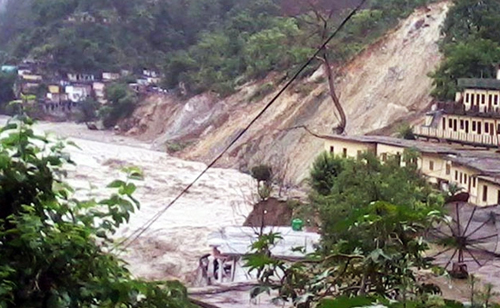
Dehradun, Jun 21: Forty bodies of flood victims were recovered from Haridwar, taking the toll in the rain fury to 190 as operations to rescue over 9000 stranded in Kedarnath and Badrinath were stepped up with the deployment of 40 helicopters.
As the magnitude of the tragedy continued to unfold, Uttarakhand principal secretary Rakesh Sharma said casualty figures can be "shockingly high".
In Haridwar, SSP Rajeev Swaroop said 40 bodies of those killed in the flash floods and incessant rains have been found.
Rescuers were focusing on rain-ravaged Kedarnath area where 250 people are stranded before shifting focus to Badrinath where 9000 people are stuck, officials said.
Terming it as the "worst tragedy of the millennium", agriculture minister Harak Singh Rawat said, "It will take us at least five years to recover from the extensive damages caused to the entire infrastructure network in the Kedarnath area which is the worst affected".
Rawat, who had visited the Kedarnath area, said that he spent five hours there and was shocked to see the extent of the damage caused to the buildings and area adjoining the shrine.
"The centre of faith has turned into a burial ground. Bodies are scattered in the area. Only the sanctum sanctorum is intact," he said.
Thousands of people were still said to be stranded in various parts of the state that was hit by cloudburst and floods in the upper reaches that left several hundreds of homes, rest houses and buildings in ruins and thousands of people missing.
In Himachal Pradesh, rescue operations were on to evacuate stranded people in rain-hit Kinnaur district with two dedicated choppers pressed into service even as reports of more people stuck in interior Pooh, Nako and Kaza areas poured in.
Two IAF choppers and one state chopper had been deployed for evacuating the stranded but one chopper has developed some problem.
"So far over 550 people have been airlifted but the number is steadily increasing with reports of more people struck at different places, pouring in.Helicopter sorties have also been planned for Pooh, Nako, Kaza and other interior places," officials said.
Army patrols were on search and rescue missions to evacuate civilians stranded along the Hindustan Tibet National Highway blocked by landslides.
While 40 people were evacuated till last evening from Nako, Malling, Khab, Dubling, Pooh and Ropa to Army camps, 140 civilians have been airlifted by armed forces' helicopters from Bhabhanagar, Rekong Peo and Rampur.
The BSNL tower at Pooh is being operated under the aegis of the Army to facilitate communication by civilians stranded in the area.
In Uttar Pradesh, the rivers Ganga and Sharda continue to flow near the danger mark as the government intensified flood relief operations and released Rs 50 lakh for the 13 affected districts.
Uttar Pradesh chief minister Akhilesh Yadav, who took stock of the situation in 13 affected districts — Saharanpur, Jhansi, Bijnore, Muzaffarnagar, Amroha, Bahraich, Lakhimpur, Meerut, Barabnki, Pilibhit, Sitapur, Balrampur and Gonda — sanctioned Rs 50 lakh for each district for flood relief operation.
The rivers Sharda at Palia Kalan and Ghaghra at Elgin Bridge and Ayodhya were still flowing above the danger mark.
The river Sharda was flowing near the red mark at Turtipar and Rapti at Balrampur while the river Ganga was rising all along its route from Fatehgarh to Allahabad.
Meanwhile, the main link between UP and Haryana remained cut off for the fourth day today due to closure of the bridge over the river Yamuna at Kairana in Shamli district.
The bridge was closed for traffic as the river Yamuna had crossed the danger mark four days ago.





Comments
Add new comment